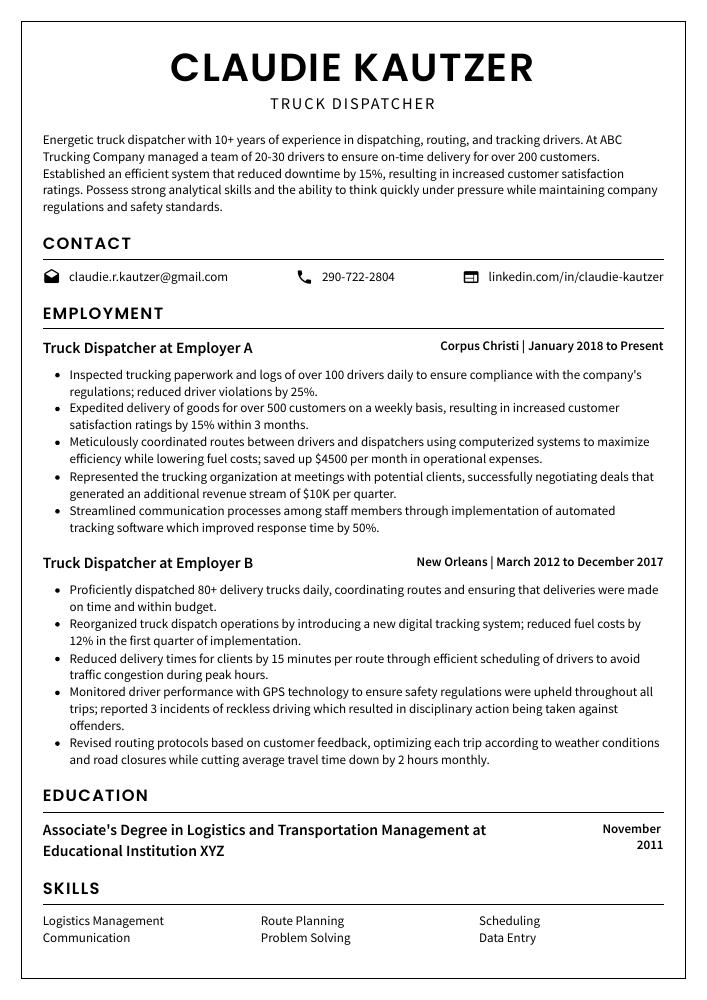Truck Dispatcher Resume Guide
Truck dispatchers are responsible for coordinating the movement of goods and materials by assigning drivers to routes, monitoring their progress, and making sure they stay on schedule. They must also ensure that vehicles meet safety regulations, maintain communication with customers about delivery times, and track shipments using computer systems.
You have the ability to keep a fleet of trucks running smoothly. But potential employers don’t know about your dispatching background yet, so you must create an impressive resume that highlights your skills and experience in order to make them aware of what you can bring to their team.
This guide will walk you through the entire process of creating a top-notch resume. We first show you a complete example and then break down what each resume section should look like.
Table of Contents
The guide is divided into sections for your convenience. You can read it from beginning to end or use the table of contents below to jump to a specific part.
Truck Dispatcher Resume Sample
Claudie Kautzer
Truck Dispatcher
[email protected]
290-722-2804
linkedin.com/in/claudie-kautzer
Summary
Energetic truck dispatcher with 10+ years of experience in dispatching, routing, and tracking drivers. At ABC Trucking Company managed a team of 20-30 drivers to ensure on-time delivery for over 200 customers. Established an efficient system that reduced downtime by 15%, resulting in increased customer satisfaction ratings. Possess strong analytical skills and the ability to think quickly under pressure while maintaining company regulations and safety standards.
Experience
Truck Dispatcher, Employer A
Corpus Christi, Jan 2018 – Present
- Inspected trucking paperwork and logs of over 100 drivers daily to ensure compliance with the company’s regulations; reduced driver violations by 25%.
- Expedited delivery of goods for over 500 customers on a weekly basis, resulting in increased customer satisfaction ratings by 15% within 3 months.
- Meticulously coordinated routes between drivers and dispatchers using computerized systems to maximize efficiency while lowering fuel costs; saved up $4500 per month in operational expenses.
- Represented the trucking organization at meetings with potential clients, successfully negotiating deals that generated an additional revenue stream of $10K per quarter.
- Streamlined communication processes among staff members through implementation of automated tracking software which improved response time by 50%.
Truck Dispatcher, Employer B
New Orleans, Mar 2012 – Dec 2017
- Proficiently dispatched 80+ delivery trucks daily, coordinating routes and ensuring that deliveries were made on time and within budget.
- Reorganized truck dispatch operations by introducing a new digital tracking system; reduced fuel costs by 12% in the first quarter of implementation.
- Reduced delivery times for clients by 15 minutes per route through efficient scheduling of drivers to avoid traffic congestion during peak hours.
- Monitored driver performance with GPS technology to ensure safety regulations were upheld throughout all trips; reported 3 incidents of reckless driving which resulted in disciplinary action being taken against offenders.
- Revised routing protocols based on customer feedback, optimizing each trip according to weather conditions and road closures while cutting average travel time down by 2 hours monthly.
Skills
- Logistics Management
- Route Planning
- Scheduling
- Communication
- Problem Solving
- Data Entry
- Load Tracking
- Fleet Management
- Fuel Management
Education
Associate’s Degree in Logistics and Transportation Management
Educational Institution XYZ
Nov 2011
Certifications
Certified Transportation Professional (CTP)
National Private Truck Council (
May 2017
1. Summary / Objective
Your resume summary should be a concise yet compelling introduction to your professional background as a truck dispatcher. Highlight the most important aspects of your experience, such as how you have successfully managed fleets of up to 100 trucks, implemented new software systems that increased efficiency by 15%, and coordinated with customers and vendors in order to ensure timely delivery.
Below are some resume summary examples:
Committed truck dispatcher with 5+ years of experience managing fleet operations for logistics companies. Proven track record of reducing operational costs and maximizing efficiency by 10%. Experienced in coordinating long-distance deliveries, streamlining supply chain processes, and handling customer inquiries at ABC Logistics. Seeking to utilize problem-solving skills to optimize performance as the next truck dispatcher at XYZ Company.
Well-rounded truck dispatcher with 8+ years of experience in the transportation industry. Experienced in coordinating routes, managing shipping documents, and tracking shipments for a variety of clients. At XYZ Logistics I streamlined processes to reduce average delivery time by 15%. Seeking to join ABC Freight as a truck dispatcher and leverage my skillset to increase efficiency while meeting customer expectations.
Professional truck dispatcher with 5+ years of experience in the transportation industry. Highly skilled at optimizing routes, coordinating shipments and resolving customer inquiries quickly. Gained expertise in shipment tracking software while working for XYZ Logistics which improved delivery times by 14%. Now seeking to leverage my knowledge and skillset to become a top-tier truck dispatcher at ABC Transport Inc.
Detail-oriented truck dispatcher with five years’ experience in the transportation sector. Skilled at developing efficient routes for drivers, monitoring driver performance, and ensuring customer satisfaction. At ABC Logistics, managed a team of 10+ dispatchers to maintain on-time delivery rates over 95%. Received an award from management for reducing fuel costs by 14% through route optimization techniques.
Reliable and experienced truck dispatcher with 8+ years of experience in managing fleets and dispatching trucks for a wide range of industries. Proven track record of meeting delivery deadlines, reducing costs, and optimizing routes to increase efficiency. At XYZ Inc., managed 10 truck drivers at any given time while ensuring compliance with regulations. Successfully increased on-time deliveries by 20%.
Accomplished truck dispatcher with 5+ years of experience managing operations and logistics for large fleets. Seeking to join ABC Logistics as a dispatcher to employ my organizational, problem-solving, and communication skills in order to ensure successful deliveries on time. In previous roles, improved process efficiency by 10% while overseeing the dispatching of up to 200 trucks daily.
Talented truck dispatcher with extensive experience in the transportation industry. At XYZ, managed a fleet of 500 trucks and handled all associated paperwork. Proven track record for improving efficiency through innovative routing solutions to reduce costs by 25%. Recognized for attention-to-detail and problem solving skills which led to improved customer satisfaction ratings of 85%.
Dependable truck dispatcher with 3+ years of experience in dispatching, route planning and tracking. At XYZ Inc., improved delivery efficiency by 20% through optimized routing that reduced total mileage traveled by 10%. Seeking to leverage the same expertise at ABC Co. to ensure timely deliveries, reduce fuel costs, and maximize customer satisfaction.
2. Experience / Employment
The employment (or experience) section is where you provide details on your work history. This should be written in reverse chronological order, so that the most recent job is listed first.
When writing this section, stick to bullet points; it allows for a quick read of what you did and achieved at each role. When describing what you did, make sure to include quantifiable results wherever possible. For example, instead of saying “Managed truck dispatches,” try something like: “Successfully managed dispatch operations for up to 20 trucks daily by utilizing an optimized route system which resulted in a 10% reduction in fuel costs.”
To write effective bullet points, begin with a strong verb or adverb. Industry specific verbs to use are:
- Scheduled
- Monitored
- Coordinated
- Dispatched
- Tracked
- Loaded
- Unloaded
- Assigned
- Resolved
- Calculated
- Inspected
- Updated
- Communicated
- Negotiated
Other general verbs you can use are:
- Achieved
- Advised
- Assessed
- Compiled
- Demonstrated
- Developed
- Expedited
- Facilitated
- Formulated
- Improved
- Introduced
- Mentored
- Optimized
- Participated
- Prepared
- Presented
- Reduced
- Reorganized
- Represented
- Revised
- Spearheaded
- Streamlined
- Structured
- Utilized
Below are some example bullet points:
- Negotiated delivery routes with over 50 truck drivers daily, ensuring shipments arrived on time and within budget while meeting customer requirements; reduced delivery costs by 10% in the last quarter.
- Advised truck drivers on best practices to maximize fuel efficiency and minimize accidents; decreased idle times by 25%.
- Tracked shipment progress using GPS technology, offering real-time updates to customers via email or phone throughout duration of deliveries; improved customer satisfaction ratings by 8%.
- Successfully coordinated freight pickup/delivery operations for over 100 different locations across 5 states during peak season periods without delays or errors; exceeded monthly volume goals 4 months consecutively.
- Optimized load configuration and route selection processes according to local traffic patterns, weather conditions & vehicle capacities for maximum cost savings per mile traveled, resulting in a 15% decrease in transportation expenses year-over-year.
- Loaded, scheduled, and dispatched 20+ trucks daily to ensure timely delivery of goods; increased customer satisfaction ratings by 18%.
- Presented detailed documents to customers outlining order status and estimated arrival times; improved accuracy in tracking shipments by 24% over a 4-month period.
- Updated dispatch software with trip information, driver logs & vehicle maintenance records on an ongoing basis for efficient operations management.
- Calculated total costs associated with each shipment including fuel expenses, route optimization techniques and labor hours; reduced trucking expenditures by 30%.
- Diligently monitored the performance of drivers across various trips utilising GPS systems for real-time traffic analysis; improved fleet efficiency by 12% within 6 months.
- Substantially reduced delivery time by 10% through effective route allocation and dispatching of 15+ trucks daily.
- Unloaded goods from incoming vehicles, checked for accuracy against invoices and organized them ready for distribution in the warehouse; increased efficiency levels by 20%.
- Improved customer service standards via continuous communication with truck drivers regarding their current whereabouts and estimated arrival times in order to meet clients’ deadlines.
- Formulated strategies to cut down fuel costs which resulted in a savings of $6,500 per quarter on transport expenses; also reduced vehicle maintenance cost by 25%.
- Achieved 100% on-time deliveries over an 8-month period thanks to careful planning & scheduling of all routes according to traffic conditions and customers’ needs.
- Developed and implemented efficient routing strategies for approximately 200 trucks, reducing total delivery time by 30% while ensuring all safety regulations were adhered to.
- Dispatched daily delivery orders and tracked cargo shipments in real-time; monitored driver performance with GPS systems to ensure on-time deliveries of over $5 million worth of goods annually.
- Assigned loads based on customer requirements and shipment size, working closely with truckers to minimize the number of stops per route; achieved an average load ratio of up to 7:1 during peak seasons.
- Structured a comprehensive weekly schedule that included 6 days/week service at two shifts (day & night) for more than 150 drivers across 8 states; coordinated last minute changes due to weather or traffic delays swiftly when needed.
- Efficiently managed communication between truckers and clients, taking ownership of conflict resolution as necessary while maintaining excellent rapport throughout each transaction process.
- Resolved over 500 customer issues, saving up to $20,000 in costs and ensuring on-time deliveries for more than 200 shipments.
- Compiled daily truck routes for a fleet of 100+ vehicles with an average distance of 350 miles per route; reduced travel time by 10% over the course of 6 months.
- Communicated effectively with drivers via radio dispatch systems regarding road conditions, traffic updates and fuel availability; improved driver safety by 20%.
- Independently organized delivery schedules around holidays or other special events while maintaining customer satisfaction levels at 95%.
- Introduced new software tools that allowed dispatchers to track trucks remotely in real-time; increased efficiency by 25% compared to traditional methods used before this change was made.
- Spearheaded the coordination of 100+ truck routes a week, ensuring delivery deadlines were met and that all vehicles maintained compliance with federal regulations.
- Coordinated the pickup and drop-off of goods to customers in a timely manner; reduced late deliveries by 20% over 3 months through efficient route planning.
- Demonstrated strong problem solving skills when handling unexpected roadblocks such as traffic delays or mechanical issues; resolved problems within an average of 2 hours thus minimizing disruption to schedules.
- Thoroughly trained 8 new dispatchers on company policies and procedures related to freight transportation; directly mentored 4 trainees who have since become successful dispatchers themselves.
- Mentored junior staff members on troubleshooting techniques for driver communication systems and provided guidance on resolving customer complaints quickly & efficiently, resulting in improved client satisfaction levels by 15%.
- Resourcefully facilitated the safe and timely dispatch of 200+ trucks daily, resulting in a 10% decrease in late deliveries.
- Scheduled routes for truck drivers based on destinations, delivery times and customer specifications; communicated updates to customers as needed throughout transit process.
- Prepared documentation related to goods being transported including bills of lading, manifests and invoices; ensured that all paperwork met safety regulations prior to loading each shipment onto trucks.
- Participated actively in health & safety training sessions for new hires regarding emergency procedures when handling hazardous materials during transportations; reduced instances of accidents by 25%.
- Monitored fleet vehicles’ performance through GPS tracking system regularly and reported any maintenance issues promptly with mechanics teams to minimize disruption caused by breakdowns or delays along trips.
3. Skills
Skill requirements will differ from one employer to the next; this can easily be ascertained from the job posting. Organization A may require knowledge of a certain truck routing software, while Organization B may require experience in customer service.
It is essential to tailor the skills section of your resume to each job you are applying for because many employers use applicant tracking systems these days. These computer programs scan resumes for specific keywords before passing them on to a human reviewer; therefore, it’s important that you include relevant ones here.
You can further elaborate on the most important skills by discussing them in more detail elsewhere on your resume – such as in the summary or experience sections.
Below is a list of common skills & terms:
- Communication
- Data Entry
- Fleet Management
- Fuel Management
- Load Tracking
- Logistics Management
- Problem Solving
- Route Planning
- Scheduling
4. Education
Including an education section on your resume will depend on how far along you are in your career. If you just graduated and have no prior experience, mention your educational background below the resume objective. However, if you have significant work experience that is relevant to the truck dispatcher role, it might be better to omit mentioning any education altogether.
If including an education section is necessary for a truck dispatcher job application, try to include courses and subjects related specifically to this type of role.
Associate’s Degree in Logistics and Transportation Management
Educational Institution XYZ
Nov 2011
5. Certifications
Certifications demonstrate to potential employers that you have taken the time and effort to become proficient in a certain field. It shows your dedication and commitment, as well as your willingness to stay up-to-date with industry knowledge.
If you have any certifications related to the job position, make sure they are included on your resume so that hiring managers can see them at first glance. This will give you an edge over other applicants who may not be certified in the same areas of expertise.
Certified Transportation Professional (CTP)
National Private Truck Council (
May 2017
6. Contact Info
Your name should be the first thing a reader sees when viewing your resume, so ensure its positioning is prominent. Your phone number should be written in the most commonly used format in your country/city/state, and your email address should be professional.
You can also choose to include a link to your LinkedIn profile, personal website, or other online platforms relevant to your industry.
Finally, name your resume file appropriately to help hiring managers; for Claudie Kautzer, this would be Claudie-Kautzer-resume.pdf or Claudie-Kautzer-resume.docx.
7. Cover Letter
Including a cover letter with your job application is a great way to make yourself stand out and show the hiring manager why you’re the best fit for the role. It should be composed of 2 to 4 brief paragraphs, separate from your resume, that provide additional information about who you are and what makes you an ideal candidate.
Cover letters give recruiters more context into who you are as a professional and they may even help them remember your name when looking through multiple applications. Although not required in most cases, writing one can greatly increase your chances of getting hired!
Below is an example cover letter:
Dear Roselyn,
I am writing to apply for the position of Truck Dispatcher with your company. With more than 10 years’ experience in the trucking industry, I have the knowledge and skills necessary to dispatch trucks efficiently and effectively.
In my current role as dispatcher for ABC Trucking, I coordinate the schedules of a fleet of 30 trucks and their drivers. I work closely with our customers to ensure that their shipments are delivered on time and within budget. I also track our vehicles using GPS software, which allows me to provide updates on ETAs and make changes to routes as needed. In addition, I handle all customer service inquiries related to shipping orders.
My strong organizational skills and ability to think quickly under pressure have allowed me to excel in this fast-paced environment. I am confident that I can bring these same skills to bear in your organization and contribute positively to your bottom line.
I would welcome the opportunity discuss my qualifications further with you at your earliest convenience. Thank you for your consideration; please do not hesitate contact me if you have any questions or require additional information about my background or experience level.
Sincerely,
Claudie
Truck Dispatcher Resume Templates
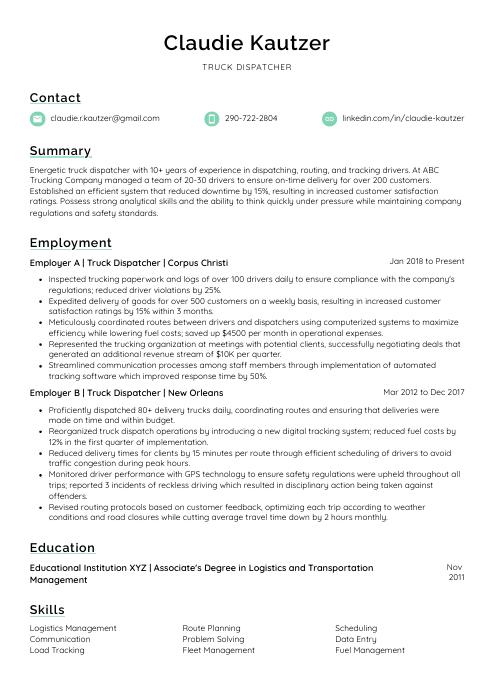 Lorikeet
Lorikeet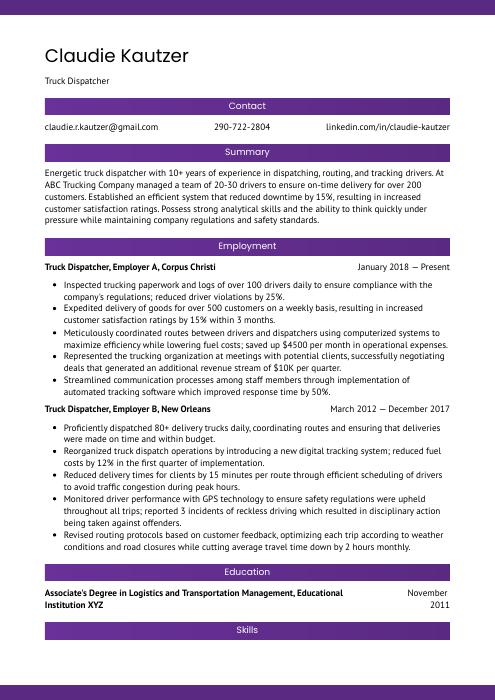 Jerboa
Jerboa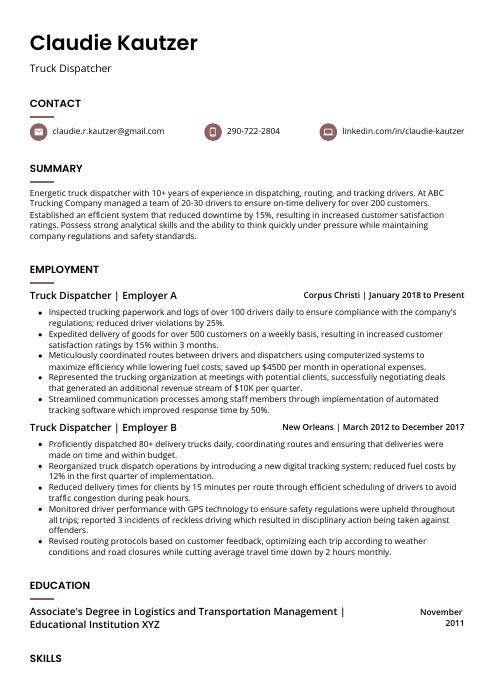 Fossa
Fossa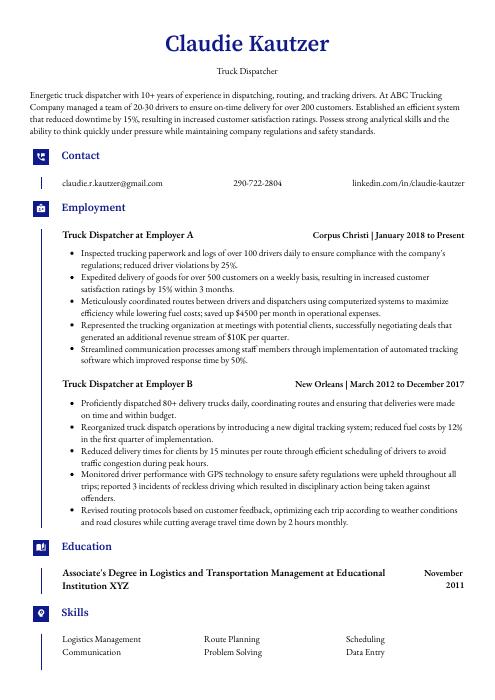 Gharial
Gharial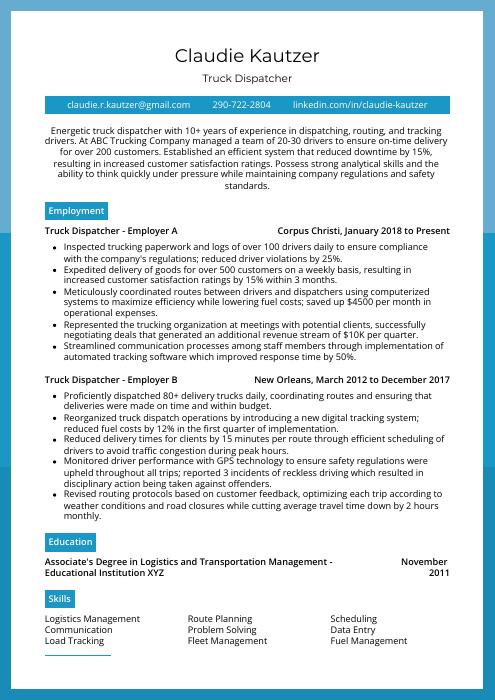 Rhea
Rhea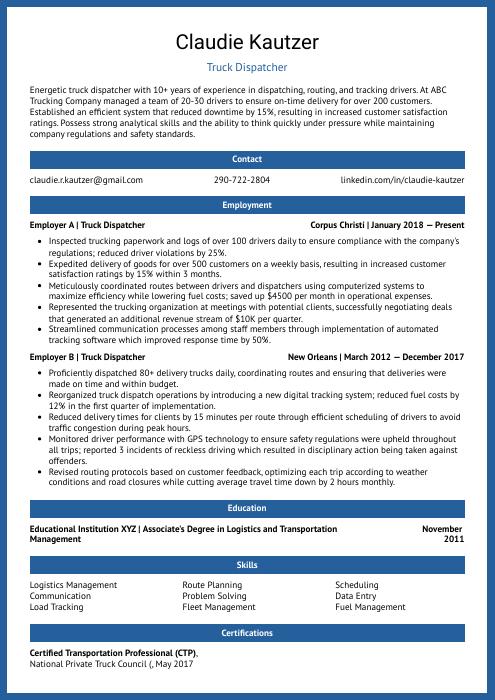 Ocelot
Ocelot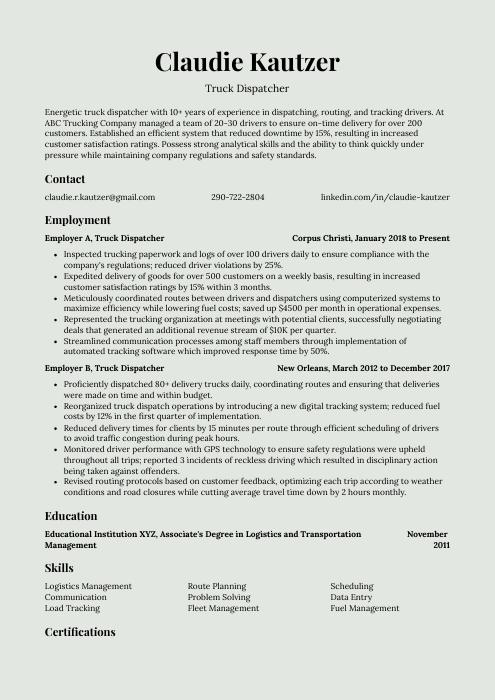 Saola
Saola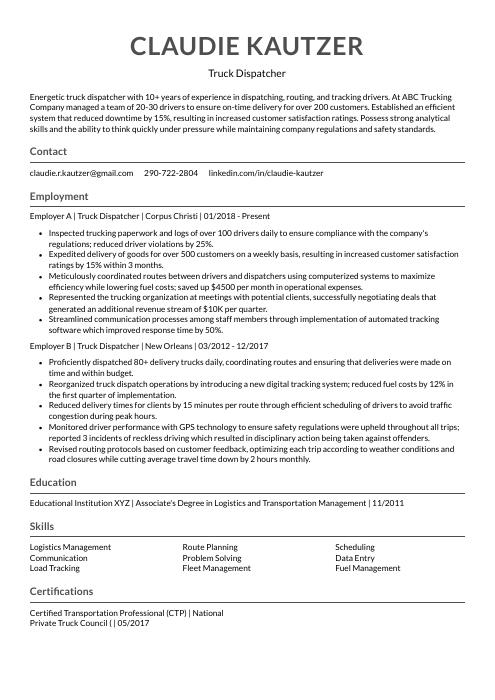 Indri
Indri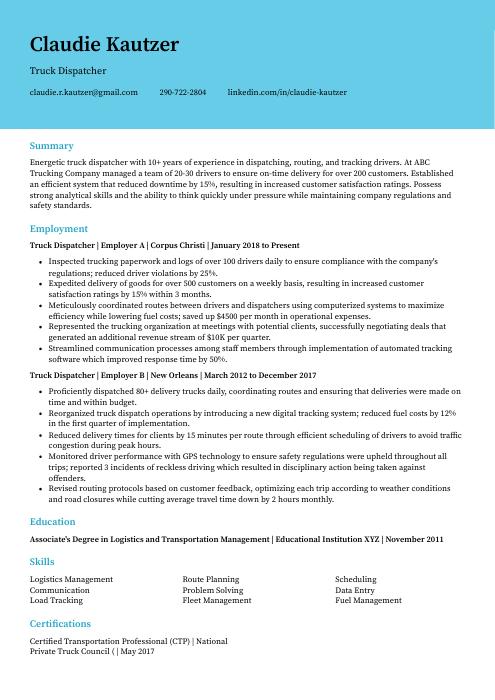 Dugong
Dugong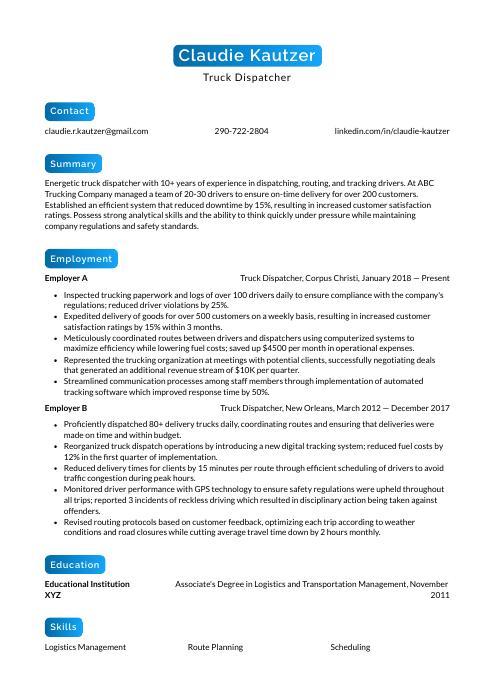 Kinkajou
Kinkajou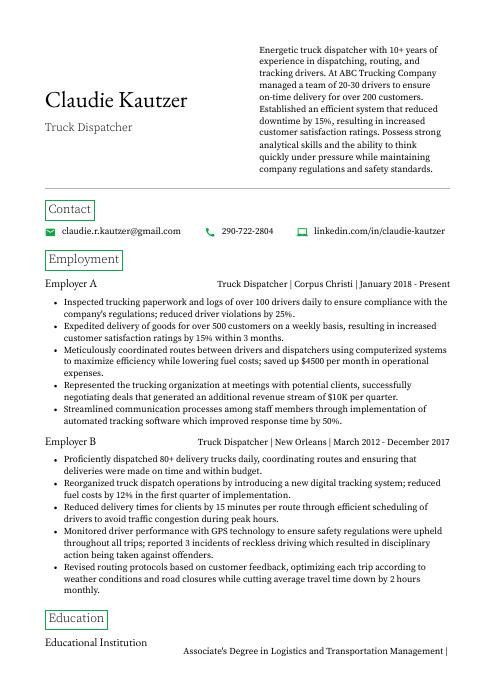 Quokka
Quokka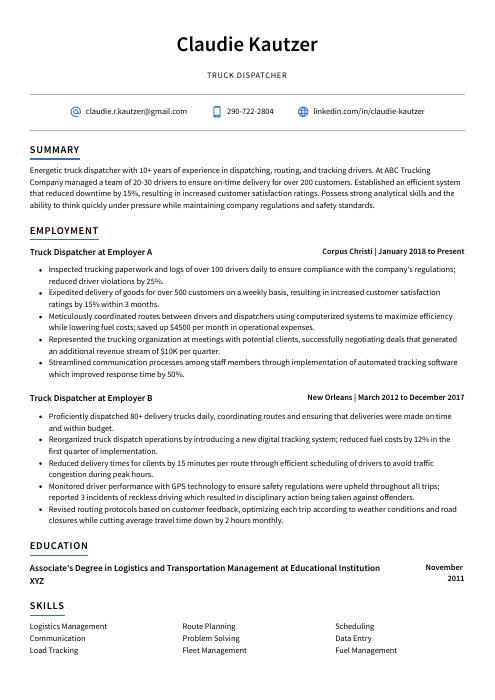 Axolotl
Axolotl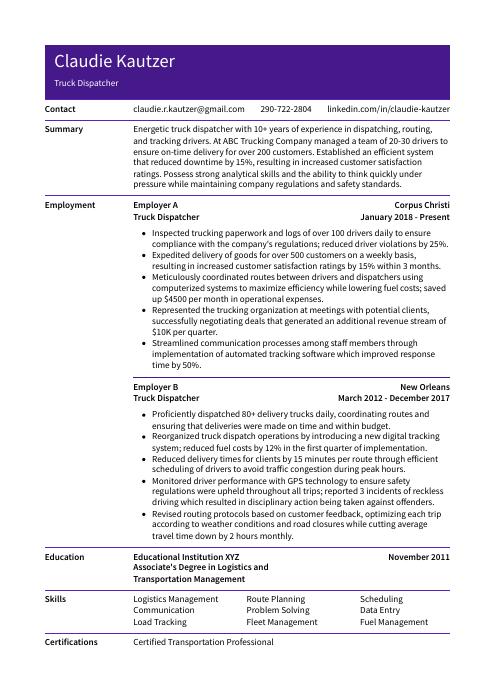 Pika
Pika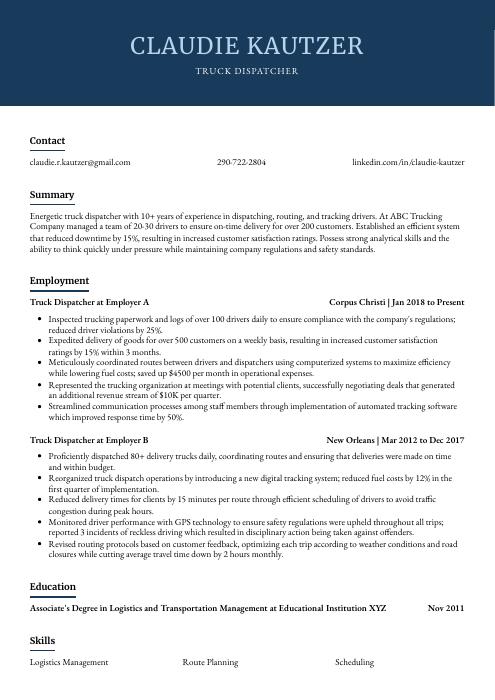 Bonobo
Bonobo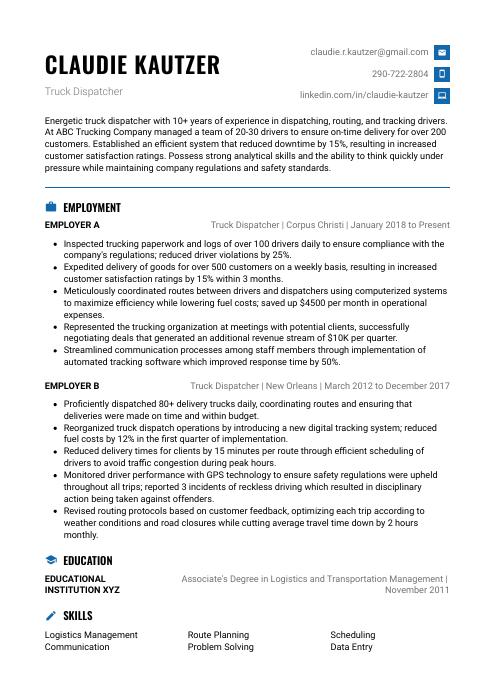 Echidna
Echidna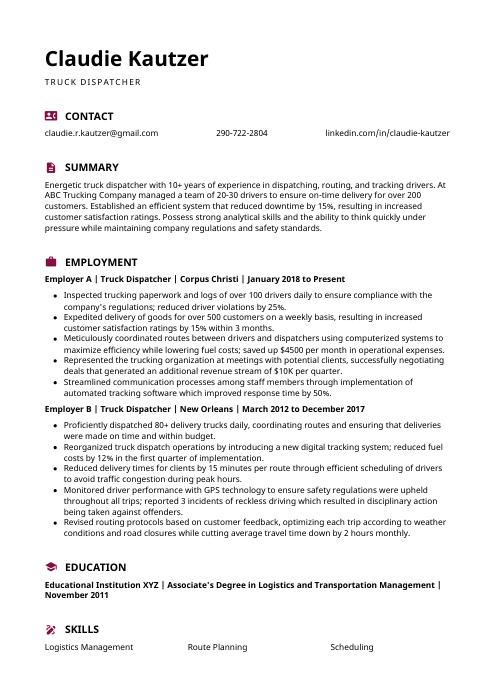 Hoopoe
Hoopoe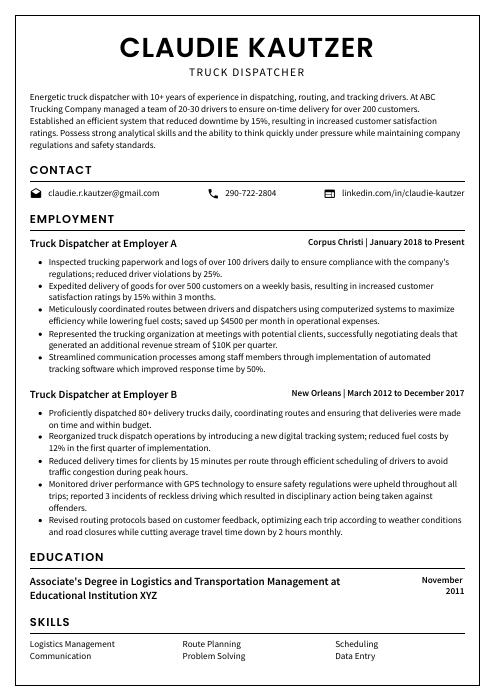 Cormorant
Cormorant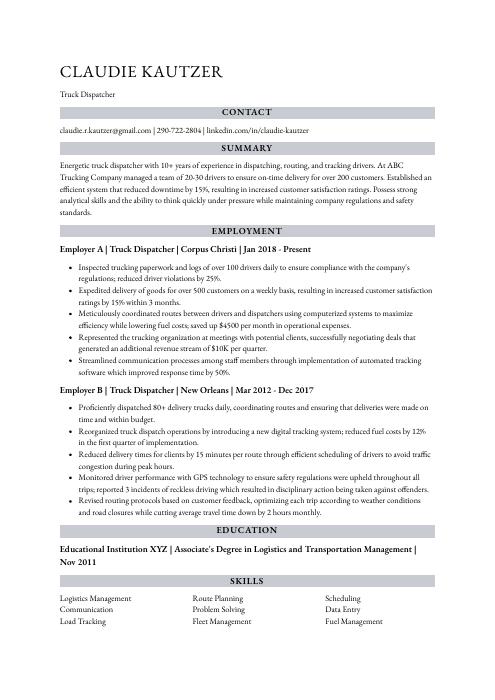 Numbat
Numbat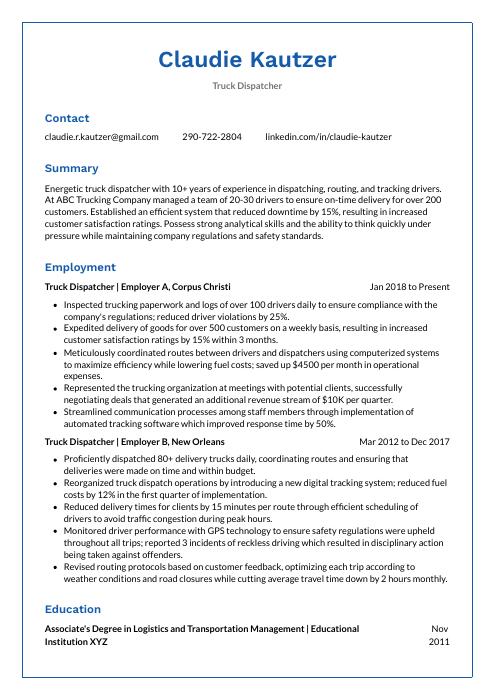 Markhor
Markhor Rezjumei
Rezjumei
